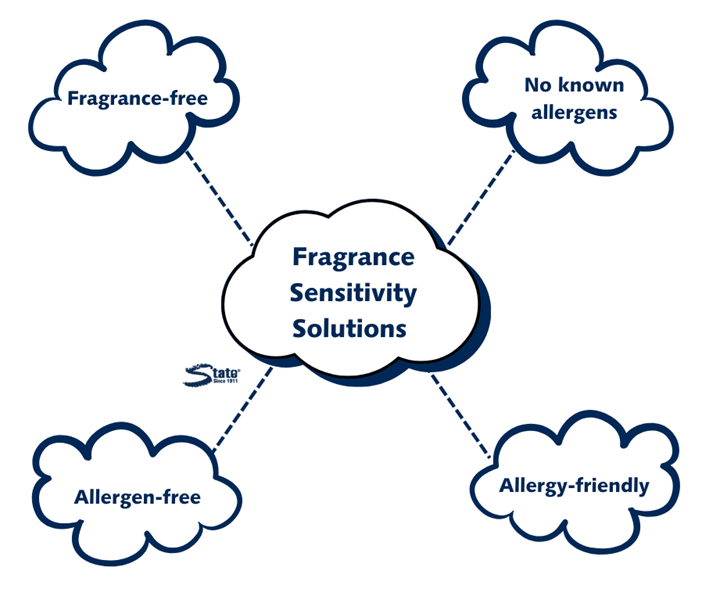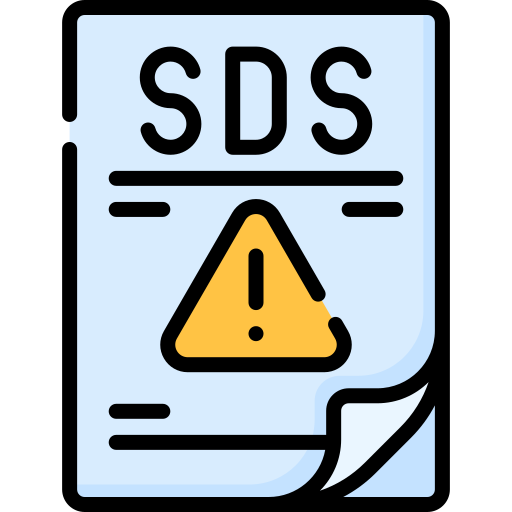Fragrance Sensitivity in the Workplace
Fragrance Sensitivity in the Workplace
You want your facility to smell fresh, but how do you make sure everyone stays safe in the process? Maybe you’re worried about employee and customer sensitivities or allergies. Maybe you’re worried about fragrance chemicals affecting the facility itself. In any case, staying informed is the best way to keep your staff and customers safe.
At State Chemical, we manufacture and distribute products for odor control, fragrancing, spot treatment, and more. We understand that when you’re dealing with chemical products, safety is one of your top priorities, and with fragrance, it can be especially difficult to know what’s an irritant.
To help you keep your staff and customers safe, we’ll be explaining the safety risks of air care products, how to handle these products, and how to keep your staff informed. After reading, you’ll know what kind of air care products to invest in and how to manage them safely.
Fragrance Sensitivity in the Workplace
Often, the main concern when it comes to fragrance is the proliferation of fragrance allergies and sensitivities. Fragrances can cause asthma flare-ups, headaches, eye irritation, skin irritation, and more in affected individuals. Additionally, if you work with animals, fragrances can irritate their respiratory systems too. When you have sensitive staff, customers, or animals, fragrance is understandably a serious concern.
Luckily, you have options.
First, try a fragrance with no known allergens. Recently, the list of identified fragrance allergens has been increased from 26 to over 80 as a result of EU Cosmetic Regulation 2023/1545. Fortunately, scents without these known allergens are not expected to cause reactions. This way, your facility can still use fragrances without causing irritation to customers and staff. Products with no known allergens will usually indicate this on the label with phrases like “no known allergens” or “allergen-free.”
However, if you’d prefer to avoid this risk altogether, you can use a fragrance-free odor control product. Again, this will be indicated on the product label, but fragrance-free options can be found in aerosols, liquids, gels, diffusers, and more.
Scent Diffusers and Vapor Fallout
In addition to triggering sensitivities and allergies, air care products can cause facility damage through fallout.
The term “fallout” refers to the wet mist from an air freshener that may sink to the surface below (i.e., usually the floor). This can be a safety risk for slipping and possible chemical incompatibility with the surface.
You already know that slipping could harm your employees and customers. When wet mist lingers on an incompatible surface, it could also cause property damage (e.g., paint peeling).
Similarly, if you have a wall-mounted fragrance system that disperses wet mist, you don’t want to place it over an electronic device.
For example, let’s say you’re looking for fragrance solutions for a library. The computer lab is a central area in the library, so you mount your fragrance system over the computers. After a few days, one of your computers starts glitching—no one noticed that it was being repeatedly sprayed with wet mist. This is exactly the kind of situation you can avoid by being mindful of where you spray your product.
Additionally, you reduce the risk of fallout when you use a fragrance with a dry vapor, like cold air diffusion. However, there are other issues that can occur with fragrance systems—even with dry vapor.
Fragrance System Malfunctions
It’s rare for your fragrance system to malfunction, but if it does, it can cause property damage.
For example, even a diffuser that emits dry vapor uses liquid. If the system malfunctions, this liquid could leak down the wall or into a puddle on the floor. Again, this could cause slips and falls, but it also means sticky floors and walls and the hassle of cleanup.
When cleaning up fragrance spills, make sure to wear personal protective equipment (PPE), meaning gloves, protective eyewear, close-toed shoes, long sleeves, and pants. This way, your skin won’t accidentally come into contact with the chemicals, which could cause skin irritation.
It’s important to be aware of these risks before investing in a system, and once you have one, it’s important to ensure it’s functioning properly to avoid these hazards.
Provide an SDS & Educate Your Staff
To keep your facility and staff safe from these risks, you must provide a safety data sheet (SDS) for all hazardous products on site. This is both legally required by OSHA and helpful for informing your staff of how to handle the products appropriately.
Additionally, generally educate your staff about safe handling. Hold training sessions. Provide infographic posters. Foster a culture of education. The more your staff knows, the safer they’ll be.
Find the Fragrance Method Best for Your Facility
When it comes to fragrancing in your facility, you want to create a safe, comfortable environment for your employees and customers. Now, you know how to choose allergy-friendly options and be aware of possible problems. Your next step is to learn about the difference between cold air diffusers and metered aerosols.










